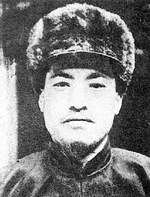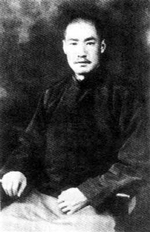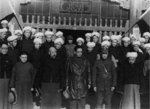Ma Bufang
| Surname | Ma |
| Given Name | Bufang |
| Born | 1903 |
| Country | China |
| Category | Military-Ground |
| Gender | Male |
Contributor: C. Peter Chen
ww2dbaseMa Bufang was born in Monigou (now in Linxia County), Gansu Province, China into an ethnic Hui family of Sufi Khufiyya Islam religion; Ma Buqing, who also played a role in the military and political arenas, was his older brother. His father was Ma Qi, the founder of the regional Ninghai Army, which was nicknamed the Ma Family Army by the locals. He received a religious education in preparation for a career as an imam. In 1922, he decided to join the military instead, completing his military training at the Officers' Training Corps in Qinghai Province, China, but he continued to lead the Great Dongguan Mosque. In 1928, he commanded the Ninghai 9th Division. During the Central Plains War of 1930, he originally sided with warlord Feng Yuxiang, but he soon switched sides to join Chiang Kaishek's Nationalist forces. In 1931, his father passed away, and his uncle Ma Lin inherited the force with the blessing of Chiang's government. In the late 1920s and the early 1930s, Ma Bufang launched seven expeditions into the Golog region of Tibet, slaughtering ethnic Tibetans and destorying Tibetan Buddhist temples in Tibet as well as in his home province of Qinghai. In 1932, Tibetans launched a counteroffensive into China, targeting the Ninghai Army, Ninghai troops under Ma and Nationalist troops under Liu Wenhui defeated the Tibetan forces, ending the war with a treaty that earned territory for the Ma family as well as Nationalist China. In 1936, Ma led Nationalist troops against Communist forces in the Ningxia region during the Long March retreat, causing serious casualties; he gave the order that captured female Communist troops were to be given to his officers as wives. In mid-1936, as 20,000 ethnic Kazakhs were driven from Sinjiang Province eastward into Qinghai Province, Ma ordered his troops to massacre these refugees despite the fact that many of them were of the Muslim faith as well. Later in 1936, he became the commanding officer of the 2nd Corps. Starting in late 1936, he began a campaign of intrigue against his uncle Ma Lin; in 1937, this campaign was successful in forcing Ma Lin to resign (who would make a religious pilgrimage to Mecca, Saudi Arabia after stepping down); Ma Bufang would take over as the governor of Qinghai Province in 1938. In this role, he was credited with starting several successful socialist educational (including but not limited to establishing a school for Muslim girls), medical, agricultural, sanitation, and road-building programs in Qinghai Province; at the same time, however, he provided very little personal freedom, while works done by journalists were heavily censored. Governing a province that was ethnically diverse, his policies in this arena was controversial, as he forced ethnic minorities such as Tibetan, Mongolian, and Kighiz peoples to abandon their native language, culture, and religion, urging them to adopt those of the Han Chinese.
ww2dbaseOn the personal level, Ma Bufang was known to be a womanizer, a fact that he was proud of and often spoke of the women he had relations with.
ww2dbaseWhen the Second Sino-Japanese War broke out in 1937, Ma Bufang was approached by the Japanese, but Ma refused to defect. Under the directions of the Nationalist government, he maintained a check on Tibet to prevent any separatist attempts while the Nationalists were tied down in the war against Japan; to this end, he ordered raids into Tibetan border regions regularly. In 1938, his forces fought against the Japanese in Henan Province, China. In Sep 1940, his troops successfully fought off a Japanese offensive, but they also earned a barbaric reputation as they refused to take any prisoners. Throughout the 1940s, his forces remained on the western regions of China, asserting pressure on Tibet while the Nationalist forces defended against the Japanese. In 1943, he became the commanding officer of the Chinese 40th Army Group. In 1944 and 1945, ordered by the Nationalist government, he commanded cavalry forces against the Soviet-backed separatists in Sinjiang Province during the Ili Rebellion.
ww2dbaseIn May 1945, Ma was elected to the Sixth Central Committee of the Nationalist Party. In 1949, he ordered the relocation of Genghis Khan's shrine to Xining, Qinghai Province. On 7 Apr 1949, Ma Bufang and his cousin Ma Hongkui announced that they would continue to fight against the Communists despite the string of victories that the Communists had been achieving in the Chinese Civil War. He was made the Chief of all Military and Political affairs of the Northwest by the Nationalist government to continue the fight in the region. In Aug 1949, he traveled to Guangzhou, Guangdong Province, China to request supplies from the Nationalist government; during his absence, his son Ma Jiyuan served as the acting commanding officer of the Northwest region. In Sep 1949, he allied with the Panchen Lama, who led a military force seeking to overthrow Dalai Lama. As Communist forces approached, Ma Bufang abandoned his territory and fled to Chongqing, Sichuan Province, and then went on to Hong Kong. In Oct 1949, Chiang Kaishek ordered him to return to the northwestern region of China to defend against the Communist advance, but instead, accompanied by 200 relatives and subordinates, Ma fled to Mecca, Saudi Arabia in early 1950 under the excuse of a religious pilgrimage. In May 1950, with the permission of King Fouad I of Egypt, he moved to Egypt, settling into a luxurious residence in the suburb of Cairo. While in Egypt, he announced his intention to organize an anti-Communist insurgency among Chinese Muslims. He served as the Republic of China's representative in Egypt until 1957 when Egypt severed relations with the Republic of China (and instead recognizing the Communist state the People's Republic of China). In 1957, he served as the ambassador to Saudi Arabia; he stepped down from his post in 1961 when a scandal broke out involving Ma forcing one of his nieces to become his concubine. He was recalled to Taiwan, the seat of the Republic of China government, to stand trial, but he refused to go, instead he obtained Saudi citizenship and remained in Saudi Arabia until his death in Jul 1975.
ww2dbaseSource: Wikipedia
Last Major Revision: Feb 2012
Photographs
 |  |  |  |
Ma Bufang Timeline
| 7 Apr 1949 | Ma Bufang and Ma Hongkui announced that they would continue to fight against the Communists despite the string of victories that the Communists had been achieving in the Chinese Civil War. |
| 9 Jan 1950 | Ma Bufang announced his intention of organizing an anti-Communist insurgency among Chinese Muslims. |
Did you enjoy this article or find this article helpful? If so, please consider supporting us on Patreon. Even $1 per month will go a long way! Thank you. Share this article with your friends: Stay updated with WW2DB: |
» Henan Campaign
- » 1,150 biographies
- » 337 events
- » 44,024 timeline entries
- » 1,242 ships
- » 350 aircraft models
- » 207 vehicle models
- » 375 weapon models
- » 123 historical documents
- » 260 facilities
- » 470 book reviews
- » 28,598 photos
- » 432 maps
Thomas Dodd, late 1945
Please consider supporting us on Patreon. Even $1 a month will go a long way. Thank you!
Or, please support us by purchasing some WW2DB merchandise at TeeSpring, Thank you!